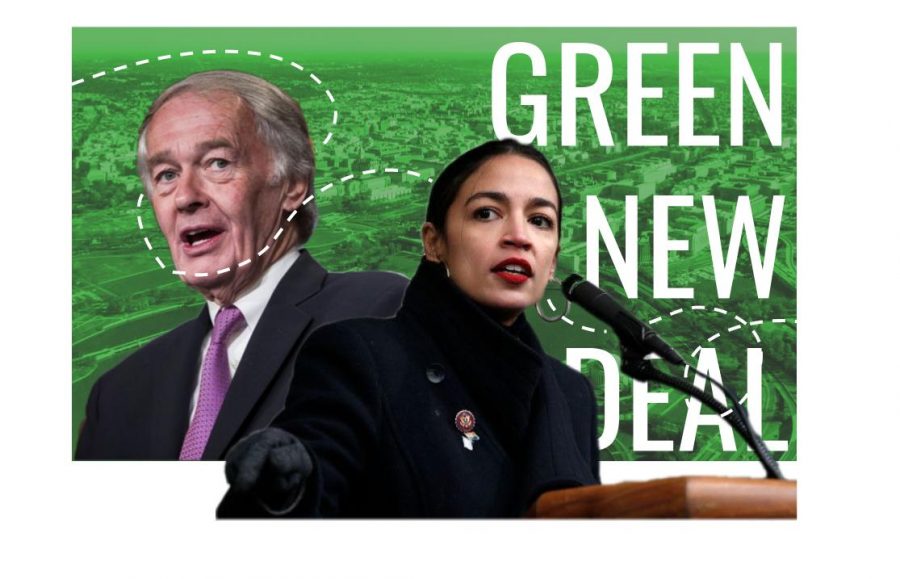Democrats Propose Green New Deal
Senators Alexandria Ocasio-Cortez and Ed Markey advocate for the Green New Deal.
April 1, 2019
On February 7th, 2019, Democratic Representative Alexandria Ocasio-Cortez and Senator Ed Markey presented a non-binding resolution widely known as the Green New Deal to Congress. Referencing the New Deal of the 1930s, the resolution proposes a series of goals aimed at addressing the issues of climate change and economic inequality. It has gained many high-profile supporters, but has also received much criticism.
The initial six-page fact sheet that was released breaks down two basic themes. One of these is a series of climate projects with the goal of achieving net-zero emissions in ten years and protecting the environment more generally. The other primary theme the document focuses on is creating programs to address “social and economic justice and security.” Of note to many, the plan calls for the nation to fully transition off of nuclear power as well as fossil fuels within ten years. Soon after, the part of the proposal having to do with nuclear power was removed after public criticism. Ed Markey later gave a speech describing the nonbinding resolution as “technology-neutral,” seemingly leaving the door open for nuclear power.
Many Democratic contenders for the 2020 Presidential race have come out in support of the proposal—candidates including Kamala Harris and Cory Booker—but other Democrats such as Nancy Pelosi and Michael Bloomberg have been more dismissive of it, describing it as unrealistic.
The nation as a whole is moving toward a consensus that climate change is a genuine threat. A recent Monmouth poll cited by CNN found that eight in ten Americans now believe climate change is real. Two of every three Republicans agree. Many Americans have begun looking for solutions. The proposals focused on climate change have more support on both sides of the political spectrum, with Florida Representative Francis Rooney and others saying that they believe the issue must be addressed. The social policies, however, such as the ones relating to minimum wages, have been met with wider disapproval. This raises practical challenges for the Democrats, in terms of passing legislation.
Most members of the CRLS community are eager for change such as that proposed in the Green New Deal, especially that related to climate change. Students and teachers alike at CRLS have expressed their dedication to raising awareness about global warming, most recently with the placement of new ceiling tiles with messages related to environmental protection and climate change.
The proposal appears to be pretty well-received in the school community. Junior Emmett Lewis-Hoeber said of the Green New Deal, “I like it, but I think it’ll have trouble being passed.” Senior Sara Jackson MacManus supported the proposals focused on addressing climate change: “We got out of the Paris Accord, so we definitely need some type of regulation to protect the environment.” Even if they don’t necessarily support every aspect of the proposal, students were happy that the issues addressed in it are now being talked about, with junior Sam Kravitz saying “I think it’s a step in the right direction.”
History teacher Christopher Montero weighed in on the proposal: “It’s clear to me that the writers of it appreciate the history of the New Deal. It is important however that today we recognize the minority groups who were left out of the original New Deal.” Mr. Montero added, “When I think of the Green New Deal what I see is a good attempt to help the people most affected by climate change, those who are already at a disadvantage as a result of discrimination. If it can deliver on that, then it holds great promise.”
This piece also appears in our March 2019 print edition.










